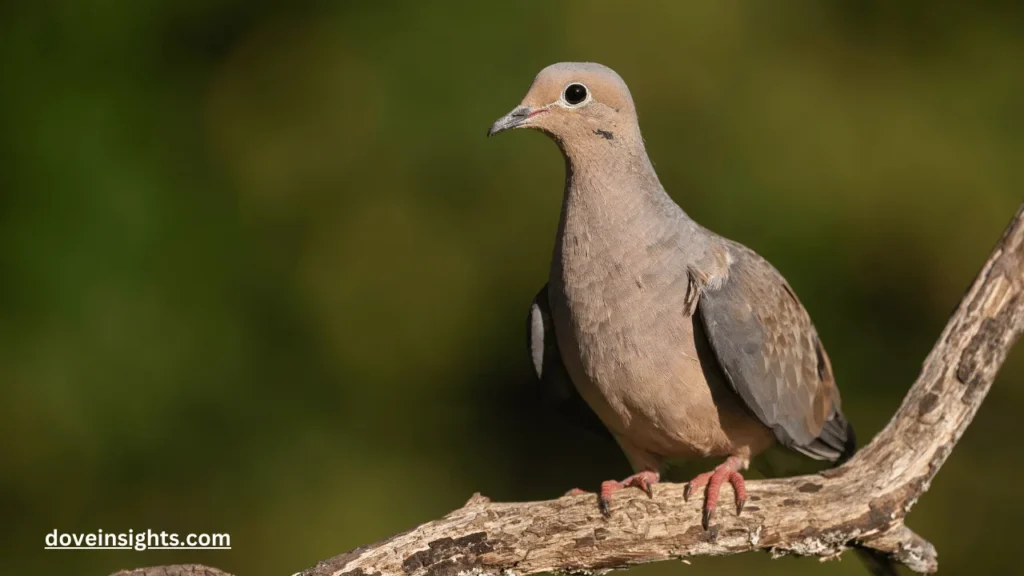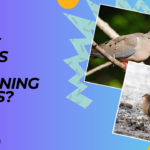Mourning doves are often seen as symbols of peace and tranquility.
Their soft, cooing calls and graceful flight patterns evoke a sense of calm, which is perhaps why they’ve earned a reputation for being docile creatures. But how much do we actually know about their intelligence?
Are these delicate-looking birds capable of complex problem-solving, or is their simplicity just a façade for a more intricate nature?
While we often associate intelligence with creatures like crows, dolphins, and even dogs, the cognitive abilities of birds like the mourning dove remain a subject of curiosity.
Unlike some of their avian relatives, mourning doves don’t exhibit obvious signs of cleverness—such as using tools or performing elaborate tricks. However, behavioral patterns observed in the wild hint at a different story. From their survival tactics to their navigational skills, mourning doves may have more going on in their minds than we give them credit for.
In this article, we’ll dive deep into the question: Are mourning doves smart? We’ll examine their problem-solving abilities, communication skills, and social behaviors, shedding light on the lesser-known aspects of these seemingly simple birds.
Contents
The Biology Behind Mourning Doves’ Behavior
Before exploring the intelligence of mourning doves, it’s essential to understand their biological makeup. Mourning doves (Zenaida macroura) are medium-sized birds found throughout North and Central America.
They are characterized by their long tails, soft gray feathers, and gentle demeanor. However, it’s their brain structure and neurological processes that give us clues about their cognitive abilities.
Research suggests that birds have brains highly adapted for specific tasks, with the avian brain being capable of complex behaviors.
Unlike mammals, birds’ brains are structured differently, but this doesn’t mean they lack the ability to process information or exhibit signs of intelligence. Mourning doves, for instance, have an advanced hippocampus, which is crucial for navigating and memory retention.
This area of the brain helps them remember landmarks, identify locations of food sources, and even detect changes in weather patterns.
Furthermore, their nervous system allows mourning doves to adapt quickly to changing environments, responding to potential threats and human presence in ways that demonstrate learning and memory.
So, while they may not perform tricks or complex tasks, the foundation for their cognitive abilities is certainly present.
One of the most impressive aspects of mourning doves’ intelligence is their navigational skills.
Unlike some animals that rely heavily on instinct, mourning doves demonstrate a remarkable ability to navigate across vast distances during their migratory journeys. These birds are known for their extensive migration routes, often traveling thousands of miles from North America to the southern United States, Mexico, and Central America for the winter months.
How do they manage such long-distance travel? Studies have shown that mourning doves use a combination of environmental cues, including the sun, stars, and magnetic fields, to guide their journey.
They can also memorize landmarks and develop mental maps of their surroundings. The ability to navigate with such accuracy requires a high level of spatial awareness and cognitive processing, indicating that mourning doves are much more attuned to their environment than many other bird species.
Furthermore, mourning doves demonstrate the ability to adapt their routes based on changing environmental conditions, such as shifts in weather or unexpected obstacles.
This level of adaptive learning and memory shows that mourning doves possess a degree of intelligence not commonly associated with their species.
Communication and Social Intelligence
Mourning doves are often heard cooing softly, but their communication goes far beyond these gentle sounds. In fact, mourning doves rely on a complex range of vocalizations and body language to communicate with one another.
These sounds aren’t just random; they have specific meanings, whether they’re signaling to a mate, warning of a predator, or marking their territory.
While the “cooing” of a mourning dove may sound simple, it plays a key role in the mating ritual. Male mourning doves use this sound to attract females, and the pitch and frequency of the coo can convey a variety of emotional states.
During the breeding season, mourning doves are also known to engage in elaborate courtship behaviors, such as puffing up their feathers, bowing, and even performing a “song-flight” to show off to potential mates.
These rituals suggest a degree of social intelligence, as mourning doves are able to assess the health and fitness of potential partners based on their behavior.
In addition to communication, mourning doves also exhibit cooperative behaviors within their species.
They can often be seen flocking together during migration or roosting in large groups for warmth and protection. This social structure indicates a level of interpersonal intelligence that is essential for survival in the wild.
Survival and Problem-Solving in Mourning Doves
Mourning doves may not build intricate nests like some other birds, but they are highly effective at surviving in a variety of environments.
Their ability to adapt to urban, suburban, and rural areas alike shows a degree of flexibility that points to problem-solving capabilities. Mourning doves often nest in trees, shrubs, and even in man-made structures, such as balconies and ledges, demonstrating their ability to evaluate and make use of available resources.
Additionally, mourning doves exhibit remarkable risk assessment skills. When confronted with predators, such as hawks or domestic cats, they can quickly take flight with precision, evading capture.
Their ability to determine safe places to rest, and their cautious nature when exploring new environments, suggests they are constantly learning from their surroundings to minimize danger.
Interestingly, mourning doves also have the ability to remember dangerous experiences. If they encounter a predator in a particular area, they may avoid that location in the future, further demonstrating their problem-solving and learning abilities.
While these birds may not solve puzzles like crows, their approach to survival is a sign of their intelligence in responding to external threats.
Emotional Intelligence in Mourning Doves

Mourning doves are often associated with peace and calm, but these birds also have a strong emotional side.
They form lifelong bonds with their mates, and their ability to display affection and care for one another hints at a deeper emotional intelligence. Mourning doves engage in mutual preening, which not only serves as a grooming mechanism but also reinforces the bond between mates.
When raising their young, mourning doves are protective and nurturing parents. Both the male and female participate in feeding the chicks, with the mother producing crop milk, a nutrient-rich secretion, to feed the young.
The dedication shown by mourning dove parents in raising their offspring indicates a level of emotional intelligence and compassion that is often overlooked in birds.
Moreover, mourning doves are highly sensitive to the presence of human activity. They can often be seen reacting to people with varying degrees of fear or curiosity, demonstrating a capacity for emotional responses that are influenced by past experiences.
This sensitivity to their environment and emotional responses to threats or comfort further adds to their overall intelligence.
Conclusion:
While mourning doves may not boast the same obvious feats of intelligence as crows or parrots, their ability to navigate vast distances, communicate, problem-solve, and display emotional intelligence paints a much more complex picture of their cognitive abilities.
These birds possess an array of traits that suggest a more intricate mind than their peaceful demeanor suggests. Their survival strategies, social behaviors, and emotional depth show that intelligence can manifest in ways that aren’t always as flashy as solving puzzles or using tools.
As we continue to learn more about the behavioral and cognitive traits of mourning doves, we can appreciate these birds not only for their gentle presence but for their adaptability, wisdom, and hidden smarts.
So the next time you hear the soft coo of a mourning dove, remember that behind that peaceful sound is a creature capable of survival, learning, and a surprising depth of intelligence.
FAQ’s
Do mourning doves have good memory?
Yes, mourning doves have an excellent memory, especially when it comes to navigating and recognizing landmarks, which helps them during long migratory journeys.
Are mourning doves territorial?
Yes, mourning doves can be territorial, particularly during the breeding season. They use vocalizations and physical displays to mark their territory.
How smart are mourning doves compared to other birds?
While not as clever as crows or parrots in terms of tool use, mourning doves exhibit significant intelligence through their navigation skills, problem-solving, and emotional intelligence.
Do mourning doves form lifelong bonds?
Yes, mourning doves typically form monogamous pairs and often stay together for life, showing strong emotional connections.
Mourning doves show cooperation and social behaviors by flocking together for safety, warmth, and during migration.
Can mourning doves recognize individual humans?
While mourning doves are generally cautious around humans, they can learn to recognize familiar human figures and respond accordingly.








